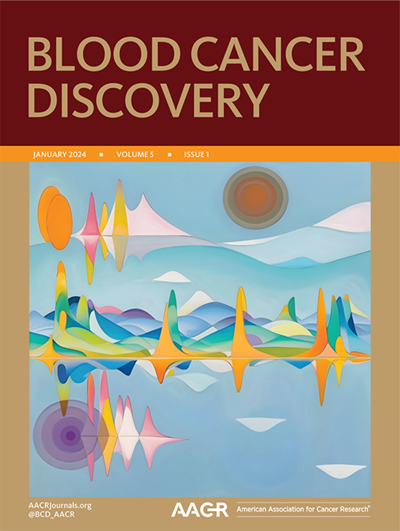Altered Oxidative Phosphorylation Confers Vulnerability on IDH1-Mutant Leukemia Cells: Is This Therapeutically Tractable?
IF 11.5
Q1 HEMATOLOGY
引用次数: 0
Abstract
Summary: Isocitrate dehydrogenase (IDH)-mutant acute myeloid leukemia (AML) is treatable with inhibitors of mutant IDH and also responds well to combination therapies including venetoclax, but most patients with IDH-mutant AML either never achieve complete remission or relapse because mutant hematopoietic stem cells persist despite treatment. An interesting new study in Blood Cancer Discovery characterizes a specific vulnerability in the mitochondrial oxidative phosphorylation system in preleukemic hematopoietic stem cells from patients with IDH1 mutations that is not present in those with IDH2 mutations; will this susceptibility prove amenable to therapy? See related article by Landberg et al., p. 114 (10).
氧化磷酸化改变使 IDH1 突变的白血病细胞变得脆弱:这在治疗上可行吗?
摘要:异柠檬酸脱氢酶(IDH)突变型急性髓性白血病(AML)可以用突变型IDH抑制剂治疗,对包括文尼他克在内的联合疗法也反应良好,但大多数IDH突变型AML患者要么从未获得完全缓解,要么复发,因为尽管接受了治疗,突变型造血干细胞仍然存在。血液癌症发现》(Blood Cancer Discovery)杂志上一项有趣的新研究描述了IDH1突变患者白血病前期造血干细胞线粒体氧化磷酸化系统的特殊脆弱性,而IDH2突变患者则不存在这种脆弱性。请参阅 Landberg 等人的相关文章 (10)。
本文章由计算机程序翻译,如有差异,请以英文原文为准。
求助全文
约1分钟内获得全文
求助全文
来源期刊

Blood Cancer Discovery
Multiple-
CiteScore
12.70
自引率
1.80%
发文量
139
期刊介绍:
The journal Blood Cancer Discovery publishes high-quality Research Articles and Briefs that focus on major advances in basic, translational, and clinical research of leukemia, lymphoma, myeloma, and associated diseases. The topics covered include molecular and cellular features of pathogenesis, therapy response and relapse, transcriptional circuits, stem cells, differentiation, microenvironment, metabolism, immunity, mutagenesis, and clonal evolution. These subjects are investigated in both animal disease models and high-dimensional clinical data landscapes.
The journal also welcomes submissions on new pharmacological, biological, and living cell therapies, as well as new diagnostic tools. They are interested in prognostic, diagnostic, and pharmacodynamic biomarkers, and computational and machine learning approaches to personalized medicine. The scope of submissions ranges from preclinical proof of concept to clinical trials and real-world evidence.
Blood Cancer Discovery serves as a forum for diverse ideas that shape future research directions in hematooncology. In addition to Research Articles and Briefs, the journal also publishes Reviews, Perspectives, and Commentaries on topics of broad interest in the field.
 求助内容:
求助内容: 应助结果提醒方式:
应助结果提醒方式:


